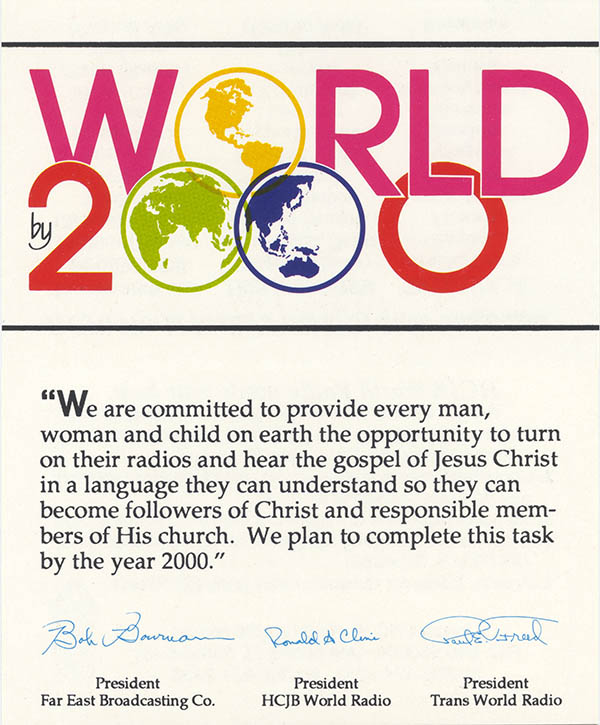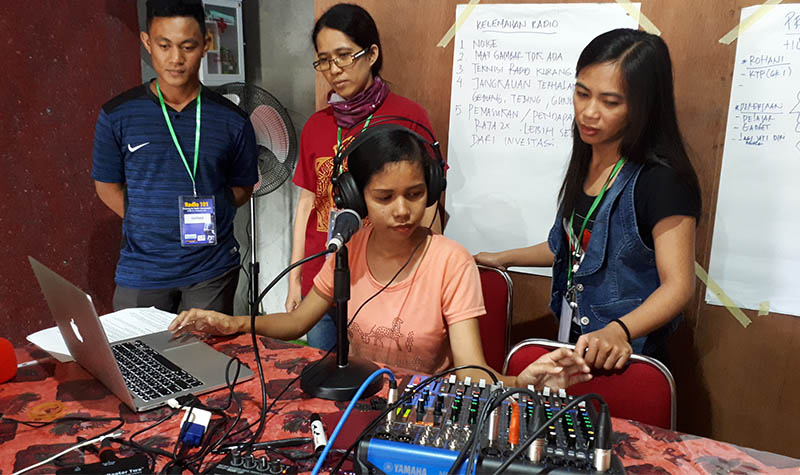 “What about 100 percent?” the voice asked.
“What about 100 percent?” the voice asked.
Ron Cline was president of Reach Beyond (then HCJB World Radio) on a flight from Germany to Chicago in 1985. As the story goes, Ron was thinking about all of the ministries that HCJB was doing and how HCJB’s shortwave signal was reaching some 80% of the world’s land surface.
“I was preparing a message for meetings in Chicago, and I was thinking about that word reach,” Ron recalls. “Were we really reaching 80% of the world with our broadcasts from Quito? If people did not understand the programs, and we had no people on the ground in those places to do follow-up, is it really reached? If we are going to say 80%, let’s make sure it is really 80%.”
That’s when he heard the voice ask, “What about 100%?” “It was an audible voice. I thought, well that’s rude. The guy behind me is reading over my shoulder. But, I turned to look, and he was asleep. It had to be God,” Ron said.
The voice on the plane sparked the World by 2000 movement that eventually brought together HCJB World Radio, Trans World Radio, Far East Broadcasting Company (FEBC), and others.
Their combined statement read, “We are committed to provide every man, woman and child on earth the opportunity to turn on their radios and hear the Gospel of Jesus Christ, in a language they can understand so they can become followers of Christ and responsible members of His church. We plan to complete this task by the year 2000.”
 This ambitious commitment both changed how we do missions today and how Reach Beyond sought to reach the unreached.
This ambitious commitment both changed how we do missions today and how Reach Beyond sought to reach the unreached.
A NEW KIND OF PARTNERSHIP
As Ron began thinking about what it would take to broadcast the Gospel in every heart language so that every person could understand, he was overwhelmed with the enormity of the challenge. It was simply too big, too difficult and too impossible for us to do by ourselves.
“We realized that in order to do this, we would have to do it together,” said Ron. “For the first time, radio ministries weren’t competing with each other. We shared contacts. If someone wanted to give, we asked them to give to the cause, not just to us. We figured out who could reach a particular group best,” said Ron. “And it grew beyond us. College ministries, Bible translators, church planters… they all started asking, how can we do this together?”
Not only did World by 2000 create cooperation among mission organizations in the West, but it also marked a dramatic shift in how we did partnership in the field. Prior to World by 2000, HCJB World Radio owned and operated all of its ministries, mostly within Ecuador. Missions in general were very West-driven: missionaries were in charge, and the local church was perceived as unable to take on the leadership role. Missionaries would often go in with their own plan of how to do ministry, rather than go in with a learner posture of, “how can I help you?”
To broadcast the Gospel in every language, however, you need people who speak the language. Since we didn’t speak the language, we had to defer to those who did. For many years, HCJB had brought native speakers (many loaned from partner ministries) to Quito to record shortwave programs and answer letters, but this wasn’t enough. While this strategy worked well with major languages, it wasn’t sustainable for every language, or even the best way to reach a community. Our founder, Clarence Jones, had always taught that the program producers should be located as close to the audience as possible.
To reach the whole world with radio, we needed to come alongside national believers and help them start their own local stations, where they could speak to their own community in their heart language. It wasn’t long before God began bringing national believers to us who were asking if we could help them start their own radio station.
“I’m often asked, ‘Why don’t you own anything anymore? Why don’t you produce your own content,’” says current Reach Beyond President, Steve Harling. “And the truth is we needed to empower local believers if we were going to reach every tribe, tongue and nation. We can share our knowledge, expertise and experience, and we can help provide them with equipment and setup the station. But then we have to step back and let God use them because we do not know the culture, speak the language, or understand how to best present the Gospel within their context. This doesn’t diminish the role of Reach Beyond, but rather it enables the Gospel to spread in a much more effective way.”
 Roger Basick, VP of International Ministries, adds, “The goal all along was to hand ministry over. Our role is to train national believers, encourage them, equip them, mentor and disciple them, and empower them to take it over. But, it’s not just to set it up and get out of the way. It takes a long time to be sustainable. We walk alongside them for the long haul.”
Roger Basick, VP of International Ministries, adds, “The goal all along was to hand ministry over. Our role is to train national believers, encourage them, equip them, mentor and disciple them, and empower them to take it over. But, it’s not just to set it up and get out of the way. It takes a long time to be sustainable. We walk alongside them for the long haul.”
GROWTH VS SUSTAINABILITY
World by 2000 and the shift towards radio planting resulted in rapid growth. We helped plant over 600 radio outlets in over 100 countries, broadcasting the Good News in more than 200 languages. Christian broadcasts go out now in nearly all of the world’s major languages – those with at least 1 million speakers. Many unreached people groups now have the opportunity to hear the message of Christ, and lives are being changed.
However, twenty years after the World by 2000 campaign deadline, there is still work to do. There are still languages that have yet to broadcast the Gospel and still more than 7,000 unreached people groups in the world.
What has happened since 2000? Did ministries give up? Did we stop working towards that goal?
On the contrary, the work still continues today in earnest. But, instead of a race to check off all the language groups, the work is focused on deepening relationships and creating sustainability.
“We have to be more strategic,” Roger says. “Adding 100 new stations in a year isn’t sustainable. That’s 100 more relationships to build, disciple and support.”
During the height of the World by 2000 project, another world event happened: the fall of the Iron Curtain. Suddenly, Russia was an open country and there was high demand for Christian missions, especially Christian radio. The combination of increased opportunity and increased cooperation among mission organizations led to a period of incredible growth and activity.
“During this time, they were begging the West to come in and help. There was almost a waiting list,” said Roger. “But today, things look quite a bit different. We don’t have the breadth of opportunities, but we certainly have the depth.”
The world is not as open to missions as it once was, especially from the West. There are many places where we cannot go, due to government restrictions, wars, terrorism and resistance to the Gospel. Since 2000, we’ve had to deal with 9/11, Al Qaeda, ISIS and the Arab Spring. It is harder today for our partners to secure licenses for Christian radio stations, with corruption and red tape slowing the process.
But we can go deep with the partners we have. We can train them up so that they begin training others. Just as we wouldn’t want to install a water well and leave before teaching them how to fix it or do maintenance, we also don’t want to plant radio stations and leave them on their own.
In the past, work was sometimes focused on helping local partners secure a radio license, building a station, training some national believers, making it “sustainable,” and then moving on. A few months later, however, the station might not be as sustainable as we thought. There may be a change in the staff at the station, a loss of financial support or an equipment failure, and the station is off the air. Follow-up training, support and maintenance is an important role. Our teams are available to check in on our station partners, months and even years down the line.
That’s not to say we don’t look for opportunities to plant new stations and build new relationships. But, the balance of work today has shifted in response to the need.
 THE IMPORTANCE OF DISCIPLESHIP
THE IMPORTANCE OF DISCIPLESHIP
During the 90’s, the former-Soviet Union was wide-open to Christian radio and Western influences. However, the political tide has turned. Most of these countries are now closed to Christian evangelism and new Christian radio stations. Our team is still investing in local believers who want to use radio to share the Gospel, but the work they do is often dangerous and is handled quietly. We provide training, funding and mentoring, but we cannot physically be in the country to do broadcasts with them.
It is the same situation in much of the unreached world, especially in the 10/40 window.
A piece that goes beyond support and training is discipleship. Many of these indigenous partners are new believers themselves. Jesus did not just tell us to proclaim the Gospel; He told us to go and make disciples. By pouring into the lives of national believers, we can train and equip them to go and make more disciples, whether through radio or through doing life in their communities. This is how you end up with a self-propagating church movement, but you have to go deep first.
The role of mission organizations from the West has changed, but it hasn’t diminished. Instead of leading the charge to evangelize the world, we are empowering the local church. An unreached people group is defined as a culture and location where Jesus Christ is largely unknown, and the church is relatively insufficient to make Him known in its broader population without outside help. There is still a need for missionaries to provide that outside help.
“Instead of influencing and leading a coalition of big mission organizations, we are influencing and leading churches and organizations on the field,” says Alex, Regional Director of the Sub-Saharan Africa Region for Reach Beyond, and current secretary of Africa by Radio (now AbR Media). “We need to enable those local voices. The local voice is going to communicate better to their audience than the big voice coming from outside.”
|
GIVE: GO: PRAY: |
